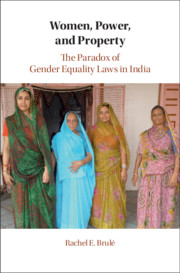Book contents
- Frontmatter
- Dedication
- Contents
- List of Figures
- List of Tables
- Acknowledgements
- 1 Introduction
- 2 A Theory of Political Representation and Economic Agency
- 3 Property and Power: A Political History of the Hindu Joint Family
- 4 Where Are the Women? Investigating Reform’s Roots
- 5 The Politics of Property Rights Enforcement
- 6 The Long Arm of Resistance: Refusal to Care for Parents
- 7 Representation and Violence: Gender Equality and Sex Selection
- 8 Conclusion
- 9 Data Appendix
- Bibliography
- Index
1 - Introduction
Published online by Cambridge University Press: 16 October 2020
- Frontmatter
- Dedication
- Contents
- List of Figures
- List of Tables
- Acknowledgements
- 1 Introduction
- 2 A Theory of Political Representation and Economic Agency
- 3 Property and Power: A Political History of the Hindu Joint Family
- 4 Where Are the Women? Investigating Reform’s Roots
- 5 The Politics of Property Rights Enforcement
- 6 The Long Arm of Resistance: Refusal to Care for Parents
- 7 Representation and Violence: Gender Equality and Sex Selection
- 8 Conclusion
- 9 Data Appendix
- Bibliography
- Index
Summary
When can quotas enable representatives and their constituents to upend hierarchies in favor of the women they are meant to empower? "Gatekeeper theory" explains the connection between political representation and economic power. It explores how quotas expanding women’s ability to gain the most influential elected role in local government fundamentally reorder power. Female leaders revolutionize how women occupy the public sphere, create new spaces for women’s benefit, and repurpose the private sphere. Where women replace traditionally male gatekeepers, they catalyze the claiming and enforcement of female rights to a crucial economic resource: land inheritance. This energizes many forms of resistance, particularly in the short term. Most striking is women’s ability to transform conflict over traditional rights into consensus over new distributions of resources when three factors align: access female political representation, substantial economic rights, and social bargaining power. Field research and large-scale data analysis confirm a key window of opportunity for women to secure rights: marriage negotiations—when many valuable resources are distributed. Where female gatekeepers can support women to claim rights at this critical juncture, women can strike integrative solutions to intrahousehold bargaining.
- Type
- Chapter
- Information
- Women, Power, and PropertyThe Paradox of Gender Equality Laws in India, pp. 1 - 18Publisher: Cambridge University PressPrint publication year: 2020



